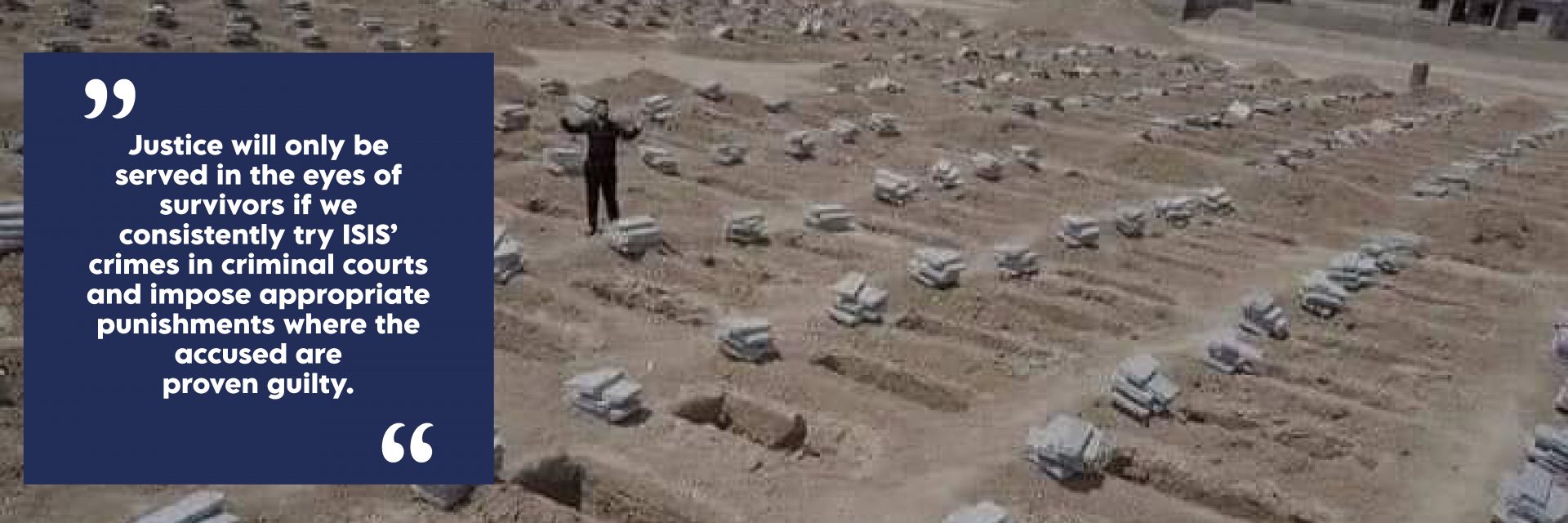8. February 2021 – ADVOCACY
A GENOCIDE WITHOUT PERPETRATORS?
One can read a lot about the crimes of the so-called “Islamic State” (ISIS) in the Middle East. “What does that have to do with us? It’s far away!”, one might think. But this fails to recognize that many perpetrators radicalized themselves in western countries and set out from places like Germany on their journey to Iraq and Syria to join the ranks of ISIS.
ISIS’ long arm reaches as far as into Germany
In recent weeks, the German government has arranged for the repatriation of three female German ISIS supporters and their children from northern Syria, who were interned in a camp for ISIS members after the defeat of the militant group. Leonora M. from Saxony-Anhalt with her two children, Merve Aydin from Hamburg-Wilhelmsburg with her two children born in Syria and Yasmin A. from Bonn are back in Germany.
According to media reports, the three women will be indicted for membership of a terrorist organization and crimes against humanity. Leonora M. is also said to have kept a Yazidi woman as a slave and later to have sold her on. Allegedly, she committed this crime in complicity with her husband Martin L., who is said to be one of very few Germans who belonged to ISIS’ secret service.
A genocide without female perpetrators? Most unlikely!
X or Y chromosomes do not determine the severity of guilt
In interviews, the women express remorse and guilt. Merve Aydin says she acted out of love when she followed her then-boyfriend to Syria at the age of 18. She had not considered the consequences of her actions. Whatever the alleged perpetrators might state on record today: In the criminal proceedings that are now being brought on, the responsible prosecutors must also ask about the women’s ideological involvement.
ISIS rampaged through Iraq and Syria and murdered and trafficked thousands of people; acts that were fueled by an inhuman ideology. The prosecution of these crimes must be as thorough in its approach as the genocide committed against the Yazidis and other minorities in the region (Christians, Shiite Muslims, Shiite Turkmen, Shiite Shabaks) on the part of ISIS was.
Fair trails, just punishments
On February 4, a memorial ceremony was held in the Iraqi capital Bagdad for 104 Yazidis murdered by ISIS during the genocide. Their place of origin was Kocho, a Yazidi village in the Iraqi Sinjar region. In August 2014, ISIS besieged and raided the village. They separated the (mostly male victims) from their families and carried out mass executions.
Thanks to years of investigative work, the remains of the dead have now been recovered from ISIS’ mass graves and the dead were able to be identified.Over the past weekend, they were buried in their ancestral homeland according to Yazidi custom. In addition to Iraqi dignitaries, the Yazidi community was also present; including Yazidis who now live in the diaspora (some of them in Germany).
These funerals are important to the bereaved families, because they make a dignified remembrance of the dead possible. However, justice will only be served in the eyes of the survivors if we consistently try ISIS’ crimes in criminal courts and impose appropriate punishments on the perpetrators when proven guilty. We must not dampen our efforts in this matter and our judgment must not be clouded by any premature leniency.
Therefore, we urgently need more cooperation between German (law enforcement) authorities and governments on all sides. The suspects must be given fair trials according to the rule of law; but the trials must also fully reflect the dimension and gravity of the crimes.
We owe this to the victims of the genocide and the bereaved families of those killed.
